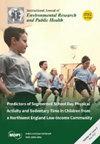Religious Affiliation, Internalized Homonegativity and Depressive Symptoms: Unveiling Mental Health Inequalities among Brazilian Gay Men
3区 综合性期刊
Q1 Medicine
International Journal of Environmental Research and Public Health
Pub Date : 2024-09-02
DOI:10.3390/ijerph21091167
引用次数: 0
Abstract
Introduction: Different religious narratives associate same-sex sexuality, in its various manifestations, with moral deviation or sin. Gay men who are socialized in more religious communities appear to experience and internalize greater levels of homonegativity, as well as to present greater indicators of depressive symptoms. The purpose of this study was to evaluate indicators of perceived homonegativity in the community and internalized, and signs/symptoms of depression reported by Brazilian gay men with a nominal religion and compare them to those reported by Atheists or Agnostics. Method: Our sample comprised 194 Brazilian gay men, distributed into three groups: Christians (Protestants and Catholics, n = 71; 36.6%); Spiritualists (Kardecists or religions of African origin, n = 52; 26.8%) and Atheists or Agnostics (n = 71; 36.6%). The following measurement instruments were used: sociodemographic questionnaire, Internalized Homophobia Scale and Beck Depression Scale. Results: High mean scores of depression were verified in all groups, and 60% of the sample presented some level of depression. There was a higher level of self-reported homonegativity among Christians and Spiritualists compared to that reported by Atheists or Agnostics, with the differences between the groups being significant. The regression analysis indicated a significant effect of religion on homonegativity, but not on depression. Conclusion: Our results suggest that gay men’s chronic exposure to non-affirming religious affiliation contexts may harm the construction of a positive gay identity and should be taken into consideration when addressing mental health inequalities of sexual minorities.宗教归属、内化的同性恋倾向和抑郁症状:揭示巴西男同性恋中的心理健康不平等现象
导言:不同的宗教叙事将各种表现形式的同性性行为与道德偏差或罪恶联系在一起。在宗教氛围更浓厚的社区中社交的男同性恋者似乎会经历和内化更严重的同性恋厌恶情绪,并表现出更严重的抑郁症状。本研究的目的是评估巴西名义上信奉宗教的男同性恋者在社区中感知和内化的同性恋倾向指标,以及抑郁症状,并将其与无神论者或不可知论者报告的抑郁症状进行比较。研究方法我们的样本包括 194 名巴西男同性恋者,分为三组:基督徒(新教徒和天主教徒,n = 71;36.6%);灵修者(卡德克教徒或非洲起源的宗教,n = 52;26.8%)和无神论者或不可知论者(n = 71;36.6%)。使用的测量工具包括:社会人口学问卷、内部化同性恋恐惧症量表和贝克抑郁量表。结果显示所有组别的抑郁平均得分都很高,60%的样本都有一定程度的抑郁。与无神论者或不可知论者相比,基督教徒和灵修者自我报告的同性恋厌恶程度更高,组间差异显著。回归分析表明,宗教信仰对同性恋倾向有显著影响,但对抑郁症没有影响。结论我们的研究结果表明,男同性恋者长期处于非肯定性宗教信仰的环境中,可能会损害其积极的同性恋身份的建立,因此在解决性少数群体心理健康不平等问题时应加以考虑。
本文章由计算机程序翻译,如有差异,请以英文原文为准。
求助全文
约1分钟内获得全文
求助全文
来源期刊

International Journal of Environmental Research and Public Health
Medicine-Public Health, Environmental and Occupational Health
CiteScore
7.30
自引率
0.00%
发文量
14422
审稿时长
1 months
期刊介绍:
International Journal of Environmental Research and Public Health (IJERPH) (ISSN 1660-4601) is a peer-reviewed scientific journal that publishes original articles, critical reviews, research notes, and short communications in the interdisciplinary area of environmental health sciences and public health. It links several scientific disciplines including biology, biochemistry, biotechnology, cellular and molecular biology, chemistry, computer science, ecology, engineering, epidemiology, genetics, immunology, microbiology, oncology, pathology, pharmacology, and toxicology, in an integrated fashion, to address critical issues related to environmental quality and public health. Therefore, IJERPH focuses on the publication of scientific and technical information on the impacts of natural phenomena and anthropogenic factors on the quality of our environment, the interrelationships between environmental health and the quality of life, as well as the socio-cultural, political, economic, and legal considerations related to environmental stewardship and public health.
The 2018 IJERPH Outstanding Reviewer Award has been launched! This award acknowledge those who have generously dedicated their time to review manuscripts submitted to IJERPH. See full details at http://www.mdpi.com/journal/ijerph/awards.
 求助内容:
求助内容: 应助结果提醒方式:
应助结果提醒方式:


